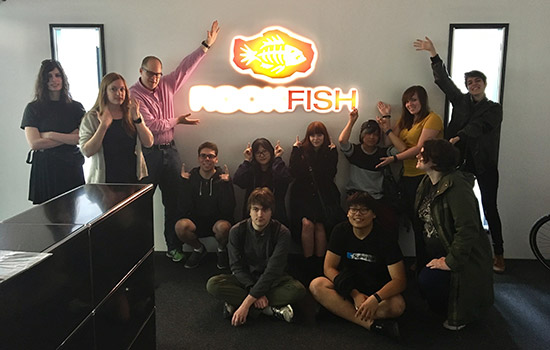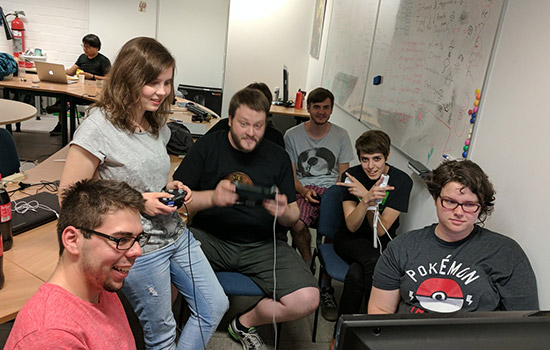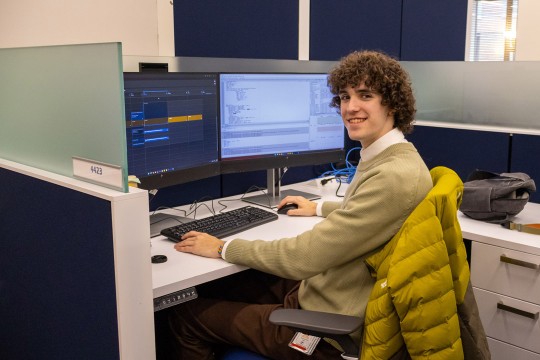Students explore German video game industry
Two-week trip features game jam with German students and tours of four game studios
The RIT group competed in a game jam with German students from the University of Paderborn. The teams had 48-hours to create video games with the theme of freedom of speech or fake news.
Ten Rochester Institute of Technology students kicked off their summer break in Germany, learning about and immersing themselves in the biggest video game market in Europe.
The two-week trip through the German cities of Dusseldorf, Cologne, Paderborn and Hamburg was the culmination of a spring semester course that introduced students to game design and development in Germany. For the study abroad program, students discussed game industry politics at the Hamburg Town Hall, participated in an extended game jam with German students and toured four game studios, including Daedalic Entertainment—best known for its award-winning point-and-click adventure games.
“We created this program because, in general, student perceptions of the game industry are pretty U.S. centric, with the exception of Japan,” said Stephen Jacobs, a professor in RIT’s School of Interactive Games and Media. “Most U.S. students don’t have much of an awareness of how international the industry is or that there are often game styles, play styles and methods of development that vary from country to country.”
In 2010, Jacobs began working on the partnership with professor Jörg Müller-Lietzkow at the University of Paderborn. The first class visited Germany in 2014 and since then, German students have visited RIT.
“As always it is a great pleasure and honor having guests from Rochester,” said Müller-Lietzkow. “Also, it’s great seeing the student's eagerness to strengthen the relationships and promote the full exchange program.”
As a part of this year’s class, students logged their adventures in a class blog, titled the RIT German Game Industry 2017.
Students learned about how different divisions work together to develop games at Daedalic Entertainment studios, while exploring the publishing side of the industry at Electronic Arts Publishing. The group also got a sense of how the independent studio Rockfish Games operates and received game design and career advice from professionals at Blue Byte, a Ubisoft studio.
“Having never toured an actual company before, it was exciting to see people from the real gaming world speaking from their experience,” said Aiden Melendez, a fourth-year game design and development major from Natick, Mass. “It was also really helpful to hear from the human resources department about the process of hiring students in particular.”
The group also spent a week with German students studying game design and development at the University of Paderborn. They discussed the differences and similarities in their studies while collaborating in a 48-hour game jam, sponsored by the Bertelsmann Foundation.
“This year it was something special because the game jam was sponsored by Bertelsmann, the world’s fifth largest media corporation," Müller-Lietzkow said. "Dr. Brigitte Mohn, a member of the foundation founder’s family, even visited the game jam to see the international teams working closely together.”
The student groups worked to create video games from scratch, with the themes of freedom of speech or fake news.
“I was partnered with a German student named Simon and pitched him my idea for an eerie 2D-platformer where you had to earn your right to speak to progress,” said Tim Ascencio, a third-year information technology major from Monroe, N.Y. “I was happy to see everyone’s results and it was impressive how far student projects could come in just two days.”
While in Paderborn, the RIT group also made its way to the Heinz Nixdorf Museum, the world’s biggest computer museum. Students also learned about the different kinds of gaming degree programs offered at the Cologne Game Lab, visited the Hamburg Zoo and played e-sports with German students at BMK, a vocational school in Hamburg.
At the Hamburg Town Hall, the group toured the parliament building where they met with Carsten Ovens, a part-time parliament member. They learned about the history of the building and discussed the games industry and why it’s important for Germany to fund games.
“It seems like there is some genuine interest in how games/gamification can be used for prosocial gains, such as getting young people interested in politics and helping immigrants learn German,” wrote Mandy Ryll, a fourth-year game design and development major from Tiverton, R.I. “Being able to help people has always been my top interest in games—I never wanted to make a AAA title so I could make lots of money, I want to use games to help the world!”
For Ariana Perry, a third-year film and animation major, the program was an opportunity to explore a field that animation students aren’t often shown.
“As animation majors, we’re shown a lot of television shows and feature films as examples of where we can head after graduation, but the gaming industry is an incredibly underrated area for animation students to go,” said Perry, who is from Tiverton, R.I. “What I got from this trip was life experience, future career connections and (as corny as it’s going to sound) a ton of new friends, American and German.”
This year’s program was made possible with help from Franzi Schloots, a research assistant at the University of Paderborn.
Jacobs said that German students plan to visit RIT next fall, as part of the program. He hopes to organize another study abroad for RIT students in the next two years.
“A trip like this helps broaden students as people and give them new experiences that can later become the basis of a more global understanding and provide new insights that may lead them to new game ideas,” said Jacobs.
 The RIT group at Rockfish Games studios in Hamburg, Germany.
The RIT group at Rockfish Games studios in Hamburg, Germany.












